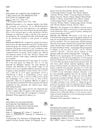 July 2023 in “International Journal of Endocrinology”
July 2023 in “International Journal of Endocrinology” Centratherum anthelminticum seed extract effectively treats Polycystic Ovary Syndrome in rats.
44 citations,
November 2018 in “Journal of applied ecology” Hair analysis for stress and reproductive hormones in wildlife needs more research for accuracy across species.
 January 2024 in “Endocrine and metabolic science”
January 2024 in “Endocrine and metabolic science” Different types of PCOS need specific diagnosis methods and treatments.
 June 2024 in “Reviews on Recent Clinical Trials”
June 2024 in “Reviews on Recent Clinical Trials” Finasteride and dutasteride may cause metabolic issues like liver disease and diabetes.

Nepenthes kampotiana extract can potentially prevent hair loss and could be an effective treatment for common baldness.
 November 2022 in “Journal of Investigative Dermatology”
November 2022 in “Journal of Investigative Dermatology” The lotion with specific plant extracts effectively increased hair growth and improved hair cycle in subjects after 3 months.
January 2010 in “Research and Practice on Chinese Medicines” Coffee extract and caffeotannic acid can help treat hair loss.
 29 citations,
January 1996 in “Journal of Pharmaceutical Sciences”
29 citations,
January 1996 in “Journal of Pharmaceutical Sciences” Finasteride poorly inhibits type 1 5AR, affecting its effectiveness.
 May 2018 in “Más dermatología”
May 2018 in “Más dermatología” The higher dose supplement was more effective in treating female hair loss.
 June 2018 in “The Journal of Sexual Medicine”
June 2018 in “The Journal of Sexual Medicine” Finasteride does not negatively affect male reproductive function.
Finasteride, a medication, is being re-evaluated for its effects and uses.
 4 citations,
January 1998 in “Heterocycles”
4 citations,
January 1998 in “Heterocycles” Researchers made two new compounds that could be used for medicine.
September 2024 in “Fitoterapia” Camellia oleifera seed shell polyphenols and 1,3,6-tri-O-galloylglucose can help treat hair loss by reducing certain hormones and promoting hair growth.
 September 2020 in “Current Enzyme Inhibition”
September 2020 in “Current Enzyme Inhibition” Three compounds were found to inhibit a prostate disease-related enzyme and reduce prostate size more effectively than the current treatment, suggesting they could be used for treating benign prostatic hyperplasia.
 17 citations,
July 2003 in “Metabolism-clinical and Experimental”
17 citations,
July 2003 in “Metabolism-clinical and Experimental” Women with female-pattern baldness produce more testosterone, but 5a-reductase inhibition treatment won't help.
 8 citations,
October 2018 in “Journal of The American Academy of Dermatology”
8 citations,
October 2018 in “Journal of The American Academy of Dermatology” The review suggests there's no agreed treatment for Frontal Fibrosing Alopecia, but hydroxychloroquine and 5a-reductase inhibitors are most effective. New treatments like platelet-rich plasma and LED light could help if standard treatments fail.
 1040 citations,
October 1992 in “The New England Journal of Medicine”
1040 citations,
October 1992 in “The New England Journal of Medicine” Finasteride effectively treats BPH but may increase sexual dysfunction risk.
 224 citations,
March 2006 in “Seminars in Cutaneous Medicine and Surgery”
224 citations,
March 2006 in “Seminars in Cutaneous Medicine and Surgery” The document concludes that understanding hair follicle biology can lead to better hair loss treatments.
 37 citations,
September 2018 in “Psychoneuroendocrinology”
37 citations,
September 2018 in “Psychoneuroendocrinology” Finasteride treatment in male rats causes long-lasting effects on depression-like behavior, brain cell growth, inflammation, and gut bacteria composition.
 30 citations,
October 2002 in “Journal of The American Academy of Dermatology”
30 citations,
October 2002 in “Journal of The American Academy of Dermatology” Use "female pattern hair loss" term, finasteride may help, more research needed.
 24 citations,
September 2015 in “JAAD case reports”
24 citations,
September 2015 in “JAAD case reports” Finasteride helps hair regrowth in frontal fibrosing alopecia.
 23 citations,
July 2003 in “Pharmacology, Biochemistry and Behavior”
23 citations,
July 2003 in “Pharmacology, Biochemistry and Behavior” Finasteride blocks progesterone's effect on absence seizures in rats.
 22 citations,
January 2006 in “International Journal of Andrology”
22 citations,
January 2006 in “International Journal of Andrology” Taking oral testosterone with finasteride or dutasteride doubles testosterone levels, and food slightly affects it.
 20 citations,
January 2018 in “Expert Opinion on Drug Safety”
20 citations,
January 2018 in “Expert Opinion on Drug Safety” Personalized treatment with inhibitors, minoxidil, and laser therapy helps hair loss.
 17 citations,
December 2015 in “BMC Complementary and Alternative Medicine”
17 citations,
December 2015 in “BMC Complementary and Alternative Medicine” A new plant extract from Avicennia marina could potentially be used to treat common hair loss.
 11 citations,
August 2019 in “BMJ”
11 citations,
August 2019 in “BMJ” Post-finasteride syndrome causes sexual, physical, and psychological symptoms, but more research is needed to understand its causes and connection to finasteride.
 10 citations,
March 2016 in “Journal of The American Academy of Dermatology”
10 citations,
March 2016 in “Journal of The American Academy of Dermatology” Finasteride's effectiveness for frontal fibrosing alopecia is uncertain.
 10 citations,
December 1995 in “Journal of women's health”
10 citations,
December 1995 in “Journal of women's health” Finasteride reduces hair growth in women with hirsutism and works better with electrolysis.
 7 citations,
June 2015 in “Journal of The American Academy of Dermatology”
7 citations,
June 2015 in “Journal of The American Academy of Dermatology” Finasteride helps treat frontal fibrosing alopecia, improving or stabilizing the condition in many patients.
 6 citations,
March 2019 in “International Journal of Molecular Medicine”
6 citations,
March 2019 in “International Journal of Molecular Medicine” Finasteride microspheres help reduce hair loss for up to eight weeks with fewer side effects.


























